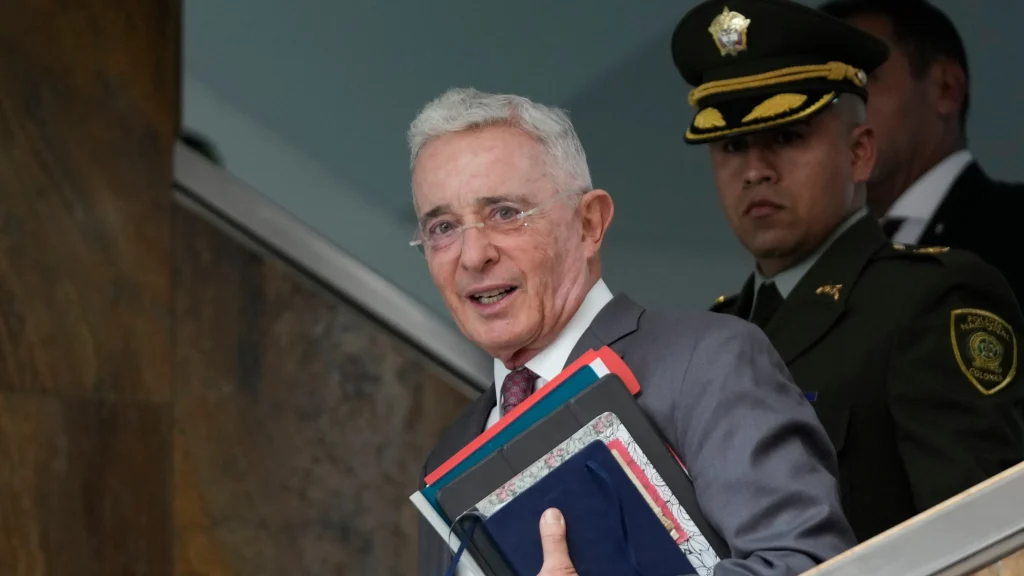The trial of former Colombian President Álvaro Uribe has taken center stage as he faces serious allegations of witness tampering and bribery charges, raising eyebrows across the nation. This landmark trial, which has been closely monitored, reveals disturbing connections between Uribe and paramilitary groups, casting a shadow over his legacy as a law and order advocate. With Uribe’s conviction looming, many are questioning the integrity of his political career and the implications of these accusations on his supporters. The jury’s decision will not only affect Uribe personally, but it may also set significant precedents in Colombian politics regarding accountability for powerful leaders. As Uribe prepares for an appeal, the eyes of the world are focused on whether justice will prevail in this contentious case that challenges the very foundations of political power in Colombia.
The legal proceedings surrounding former President Uribe echo a broader narrative of corruption and governance in Colombia, as he is implicated in serious accusations that include witness manipulation and ties to clandestine paramilitary factions. His trial represents a significant moment in Colombian history, reflecting the ongoing struggle between political elites and the demand for justice. Beyond the courtroom, this case has incited public discourse about the accountability of powerful figures within the government. As Uribe’s appeal looms, the discourse around his potential conviction and its ramifications for the future of Colombian politics becomes ever more critical. This evolving situation underscores the importance of transparency and ethical conduct within the highest echelons of authority.
The Historic Trial of Álvaro Uribe: A Turning Point in Colombian Politics
The trial of Álvaro Uribe marks a defining moment in Colombian history, one that raises questions about the integrity of political leadership. The former president’s conviction on charges of witness tampering and bribery brings to light the shadowy connections between powerful political figures and paramilitary groups in Colombia. This case is not just about Uribe; it’s emblematic of a broader struggle against corruption and impunity that has long plagued the nation.
As a conservative stalwart and a pivotal figure in Colombia’s fight against insurgency, Uribe’s downfall is significant. The nearly six-month trial exposed manipulative tactics employed by those in power to maintain their grasp on authority, further energizing discussions around accountability and justice in the political arena. The ramifications of this ruling may reverberate throughout Colombian society for years to come.
Understanding the Charges: Witness Tampering and Bribery
The charges against Álvaro Uribe are serious and shed light on the murky interactions between politics and criminal organizations in Colombia. Witness tampering, in particular, involves attempts to distort the course of justice by influencing testimonies that could implicate powerful figures. Evidence presented during the trial illustrated an alarming attempt by Uribe to persuade former members of paramilitary groups to change their statements, thus revealing the intricate web of political machinations at play.
Bribery charges further complicate the narrative, suggesting that Uribe went to great lengths to conceal his alleged connections with these paramilitary entities. The implications of such actions raise critical questions about the ethical responsibilities of leaders and the lengths they might go to maintain their public image and political legacy.
Álvaro Uribe’s Paramilitary Connections: A Legacy of Controversy
Uribe’s tenure as president was marked by significant military advancements against guerilla groups, but it was also overshadowed by troubling allegations of connections to paramilitary organizations. These groups, notorious for their brutal tactics, have long been implicated in human rights abuses across Colombia. As evidence during the trial emerged, it became increasingly difficult to separate Uribe’s political accomplishments from the dark realities of his past affiliations.
Critics suggest that these paramilitary connections were pivotal in shaping Uribe’s toughest stances against leftist insurgents, creating a complicated legacy. The recent trial not only interrogates Uribe’s presidency but also compels the Colombian public to grapple with the enduring impact of para-political alignments on the nation’s democratic processes.
The Anticipation of an Uribe Appeal
In light of the contentious ruling against him, former president Álvaro Uribe is expected to launch an appeal, seeking to overturn the charges of witness tampering and bribery. This appeal process will be closely monitored, as it represents a pivotal moment for Uribe and his supporters, who believe in his innocence and argue that the trial was influenced by political motives. The outcome of this appeal could alter the trajectory of his legacy and influence future political dynamics in Colombia.
Understanding the appeals process is crucial, as it involves complex legal arguments that will challenge the foundational aspects of the trial. Observers are left wondering whether the higher courts will uphold the conviction or acquit Uribe, thus reshaping the narrative surrounding accountability in Colombian politics.
The Impact on Colombia’s Political Landscape
The conviction of Álvaro Uribe has sparked significant debate within Colombia about the integrity of its political institutions. Many Colombians view this trial as a step towards rectifying the historical injustices associated with political corruption and criminal complicity. Regardless of the final outcome of the appeal, the implications of Uribe’s case highlight a broader demand for transparency and accountability in a system that has long been resistant to change.
As the nation reflects on the implications of this ruling, there is a growing consensus that past misdeeds must be addressed if Colombia is to move forward. The Uribe trial underscores the critical need for reforms that restore public confidence in political figures and ensure that leaders are held accountable for their actions.
The Role of the Judiciary in Colombia
The Uribe trial serves as a litmus test for the Colombian judiciary, which has often been viewed through a lens of skepticism due to rampant corruption allegations. The judiciary’s ability to impartially apportion justice, especially in cases involving powerful figures, is crucial to re-establishing faith in Colombia’s legal system. Judge Sandra Heredia’s lengthy ruling demonstrates the judiciary’s responsibility in navigating politically charged cases, ensuring that justice prevails.
Moving forward, the judiciary’s handling of the Uribe appeal will be closely scrutinized. A fair and thorough review could set a precedent for future cases involving political leaders and potentially restore public confidence in the legal system’s ability to act independently of political influence.
Public Perception of the Uribe Conviction
Public reaction to the conviction of Álvaro Uribe has been mixed, reflecting deeper societal divisions within Colombia. Supporters of Uribe view the trial as a politically motivated attack against a leader who took significant risks to combat violence in Colombia. Conversely, opponents argue that the conviction is a necessary action toward genuine accountability in an era marked by corruption and human rights abuses.
The discussions surrounding public perception are ongoing, as citizens continue to grapple with the implications of governance that intertwines with criminal elements. This case is not just about Uribe, but about the Colombian psyche—how the legacy of leaders is assessed in light of their integrity and actions.
Historical Context of Corruption in Colombian Politics
The backdrop of corruption in Colombian politics extends far beyond the trial of Álvaro Uribe. It reflects decades of governmental failures intertwined with violence from paramilitary groups, drug cartels, and political actors seeking to consolidate power. Uribe’s presidency, amid this troubling history, initially offered hope for stability and security, but now the allegations of witness tampering and bribery taint that legacy.
Recognizing the historical context of corruption is essential in understanding the current political landscape. The Uribe trial serves as an important chapter in Colombia’s ongoing struggle against a history that intertwines political ambitions with acts of violence and injustice, pushing the country to reevaluate its commitment to a transparent democratic system.
The Future of Álvaro Uribe’s Political Influence
Despite the tumultuous events surrounding the trial and conviction, Álvaro Uribe remains a significant figure in Colombian politics. His established network of supporters and the political ideals he championed continue to resonate, suggesting that his influence may persist, even in the face of serious legal troubles. Should Uribe’s appeal succeed, it could rejuvenate his political career and alter the course of the opposition in Colombia.
Conversely, if the appeal fails and the conviction stands, Uribe may face a diminished role in shaping future political narratives in Colombia. His legacy, marked by both achievements and controversies, will be a topic of intense debate as his supporters and critics weigh his contributions to the nation’s political evolution.
Frequently Asked Questions
What are the main charges in Álvaro Uribe’s trial?
Álvaro Uribe faced serious charges, including witness tampering and bribery, during his trial. These charges stem from allegations that Uribe conspired to influence testimonies from former paramilitary group members to protect his reputation against claims of having paramilitary connections.
What was the outcome of the Álvaro Uribe trial?
The outcome of the Álvaro Uribe trial was a conviction for witness tampering and bribery. This historic ruling has significant implications for Uribe’s legacy and marks a pivotal moment in Colombian politics.
How does the Uribe trial relate to the claims of paramilitary connections?
The Uribe trial is closely linked to claims of paramilitary connections, as the prosecution presented evidence suggesting that Uribe attempted to manipulate witnesses who accused him of involvement with a paramilitary group established in the 1990s.
What is Álvaro Uribe’s potential sentence following his trial?
Following his trial, Álvaro Uribe faces a maximum sentence of 12 years in prison due to the witness tampering and bribery charges brought against him.
Is Álvaro Uribe planning to appeal the trial’s ruling?
Yes, Álvaro Uribe is expected to appeal the ruling from his trial to a higher court, potentially seeking to overturn the conviction resulting from the allegations of witness tampering and bribery.
What prompted the investigation that led to the Álvaro Uribe trial?
The investigation leading to the Álvaro Uribe trial was prompted by a libel suit he filed against Senator Ivan Cepeda in 2012. However, the Supreme Court dismissed the charges against Cepeda and launched an investigation into Uribe in 2018.
Who presided over the Álvaro Uribe trial?
The Álvaro Uribe trial was presided over by Judge Sandra Heredia, who conducted a lengthy ruling detailing the sufficient evidence for Uribe’s conspiracy to tamper with witnesses.
What impact could the Álvaro Uribe trial have on Colombian politics?
The Álvaro Uribe trial could have a profound impact on Colombian politics, as it raises questions about accountability among political leaders and could influence public perception regarding corruption and paramilitary ties.
| Key Points | Details |
|---|---|
| Conviction Date | Monday, following a nearly six-month trial. |
| Charges | Witness tampering and bribery. |
| Judge’s Name | Judge Sandra Heredia. |
| Evidence Presented | Uribe conspired with a lawyer to influence witnesses. |
| Background of the Case | Dates back to 2012, involving a libel suit against Ivan Cepeda. |
| Potential Sentencing | Uribe could face up to 12 years in prison. |
| Next Steps | Uribe plans to appeal the ruling in a higher court. |
Summary
The Álvaro Uribe trial marks a significant moment in Colombian history, as it highlights the legal challenges faced by former leaders. The conviction of Uribe for witness tampering and bribery not only affects his legacy but also sheds light on the connections between politics and paramilitary groups in Colombia. With a potential sentencing of up to 12 years and the prospect of an appeal, the implications of this trial will likely resonate across the nation and influence future political discourse.



